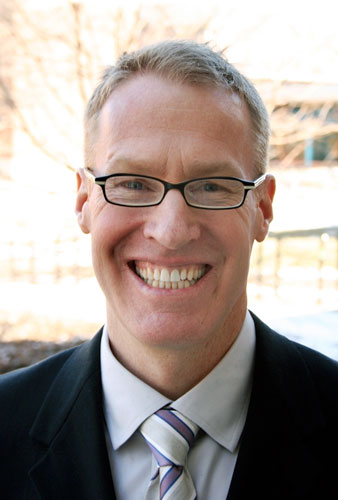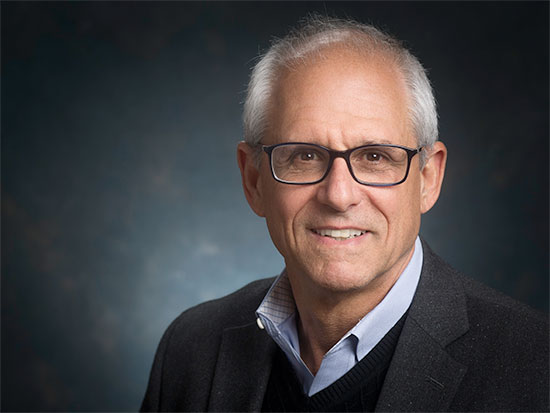 Robert Motl, Ph.D., a professor in the School of Health Professions, developed the exercise program used in the study.Researchers studying methods of exercise delivery and the effects on people living with multiple sclerosis have been awarded $5.7 million in funding by the Patient-Centered Outcomes Research Institute (PCORI).
Robert Motl, Ph.D., a professor in the School of Health Professions, developed the exercise program used in the study.Researchers studying methods of exercise delivery and the effects on people living with multiple sclerosis have been awarded $5.7 million in funding by the Patient-Centered Outcomes Research Institute (PCORI).
The research represents a collaboration between Robert Motl, Ph.D., a professor at the University of Alabama at Birmingham School of Health Professions and associate director of Research for the UAB/Lakeshore Research Collaborative, and Deborah Backus, P.T., Ph.D., director of Multiple Sclerosis Research at Shepherd Center. Gary Cutter, Ph.D., professor of biostatistics at UAB, will run the project’s data analysis core. Motl directs the Mobile Technology Lab of the Rehabilitation Research Resource to Enhance Clinical Trials (REACT) Center based at UAB; Cutter is REACT’s associate director.
The study, “Comparative Effectiveness of an Exercise Intervention Delivered via Telerehabilitation and Conventional Mode of Delivery,” will evaluate the effectiveness of different types of exercise programs for people with multiple sclerosis. The project will compare exercise programs provided at gyms or rehabilitation facilities with a telerehabilitation program available to patients at home. The goal is to increase the accessibility and sustainability of exercise options for people with MS.
“This is an exciting partnership to evaluate whether telerehabilitation delivery is as effective as facility-based delivery,” Motl said. “If it is, it has the potential to break down barriers to exercise for people in remote areas who do not have access to MS experts.”
“People with MS often have decreased mobility that can lead to more disability and less physical activity and participation in daily life activities,” said Backus, whose research focuses on improving the health and function of people with MS. “Though exercise has been shown to decrease symptoms of MS and improve mobility, many people with MS face obstacles to exercise, such as inaccessibility, affordability, lack of knowledge and training, as well as symptoms of MS that can make exercising difficult.”
In addition to being co-principal investigator of the study, Motl developed the exercise program being implemented in the study.
“The exercise program itself was developed based on 15 years of research on exercise in persons living with MS, and has been optimized for maximizing compliance and adaptations,” Motl said.
The project will enroll people with MS who are able to walk slowly at multiple sites. They will be assigned to one of two exercise groups: a facility-based exercise training or a telerehab exercise training group. In both cases, participants will receive evidence-based exercise guidelines and support. One group of participants will be in a gym or rehabilitation center, and the other group will participate in the telerehab exercise training at their homes. Researchers will measure participants’ ability to walk, their perception of their mobility and symptoms and quality of life, and their confidence level with exercising or participating in physical activities on their own.
 UAB professor and biostatistician Gary Cutter, Ph.D., will run the study’s data analysis core.“With the findings of this study,” Backus said, “our goal is to develop tools to help educate people with MS, as well as caregivers, community providers, insurers and policymakers, about different modes of exercise interventions to help them make educated choices about which one might be most beneficial for any given person with MS. That we are also evaluating the impact of choice on participant outcomes is a novel aspect of the study.”
UAB professor and biostatistician Gary Cutter, Ph.D., will run the study’s data analysis core.“With the findings of this study,” Backus said, “our goal is to develop tools to help educate people with MS, as well as caregivers, community providers, insurers and policymakers, about different modes of exercise interventions to help them make educated choices about which one might be most beneficial for any given person with MS. That we are also evaluating the impact of choice on participant outcomes is a novel aspect of the study.”
Shepherd Center is the lead site for the study. Other collaborators include Kevin McCully, Ph.D., at the University of Georgia; Jeffrey R. Hebert, P.T., Ph.D., MSCS, at the University of Colorado; Francois Bethoux, M.D., at the Cleveland Clinic Mellen Foundation; Eduard Gappmaier, P.T., Ph.D., at the University of Utah; Alexander Ng, Ph.D., at Marquette University; and Robert McBurney, Ph.D., of the Accelerated Cure Project.
This innovative study was selected for funding through a PCORI funding announcement focused on comparing the effectiveness of treatment options for people with MS. While there are many types of therapies available to people with MS, input from a variety of stakeholders helped PCORI identify this as an important topic for research based on the lack of evidence available to help patients and other stakeholders choose among the available care options.
“This project was selected for PCORI funding for its potential to fill an important gap in our understanding of MS treatment,” said PCORI Executive Director Joe Selby, M.D., MPH. “It will provide useful information to help patients and their caregivers weigh the effectiveness of their care options. We look forward to following the study’s progress and working with Shepherd Center and its collaborators to share the results.”
This award has been approved pending completion of a business and programmatic review by PCORI staff and issuance of a formal award contract.